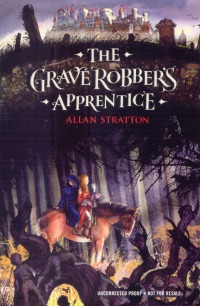| ________________
CM . . . . Volume XVIII Number 16 . . . . December 16, 2011
excerpt:
In the fictional European archduchy of Waldland, two young teens find themselves on the run: Hans, an orphan fleeing his adopted father who wants him to follow in his footsteps as a grave robber, and Angela, a lesser noble’s daughter trying to escape a forced marriage to the feared Archduke Arnulf. The two meet up when Angela attempts to fake her own death to escape and is nearly entombed alive when the suspicious Archduke imprisons her loving parents, leaving only Hans to free her from her crypt in a botched final attempt at grave robbing. Pursued by the Archduke and his feared chancellor, a blind but resourceful warlock known as the Necromancer, the two are helped along by the legendary Wolf King (who turns out to be an unappreciated poet who turned to banditry), a group of hermits living in the mountains, and a travelling Italian circus family called the Pandolinis. Learning that Hans is actually the son of Arnulf’s brother Frederick, the rightful Archduke whom Arnulf thought he’d murdered along with his son, the pair smuggle themselves in the Pandolinis’ circus wagon to their performance at the palace where they are discovered despite a daring escape attempt. Hans – actually Prince Johannes – contrives a brilliant scheme to make the Necromancer’s impossible prophecies of things that would end Arnulf’s reign seem to come true, turning his troops and his subjects against him just as Angela and her parents are to be burned at the stake. Arnulf dies, the Necromancer escapes, and the beloved Archduke Frederick returns to the throne. Allan Stratton, best known for well-researched internationalist teen fiction, tries his hand at historical fantasy, producing a book that is sure to become a Canadian classic of the genre. Combining fast-paced adventure, exquisitely drawn characters, and a moral clarity that doesn’t seem the least bit contrived, Stratton has produced a book that is at once highly original and yet reminiscent of some of the finest moments of children’s literature, evoking the fantastical imagination and the subtly grim humour of Joan Aiken, right down to the wolf imagery of her Wolves of Willoughby Chase. Stratton’s Necromancer, as portrayed in the excerpt above, is perhaps the most fascinating, if occasionally frustrating, character. Rather than relying on magic, the manipulative Necromancer weaves spells of the imagination, using a dense herbal knowledge and highly a highly developed sense of smell in order to divine his prey’s next moves. And it is here that the book becomes much more than sheer fantasy, for, in fact, there is little, if anything, that violates the rules of the known world. This is made clear when he soothes the jittery Arnulf with the prophesy, spread by the Court to the entire archduchy, that his reign will last until the forest comes to the capital. To make the prophecy come true and so turn Arnulf’s subjects against him, Hans conspires with the Wolf King to have his bandits march on the capital covered in foliage from the nearby woods, thereby exposing not black magic, but a political regime that rules by fear. Stratton’s evocation of Arnulf’s medieval police state is sublime, creating the kind of pathos that hooks sensitive readers right from the start. So while not a pure fantasy, the story does hinge on a large number of fantastical elements – usually daring escapes – that would frankly be less than convincing in the hands of a lesser artist: the Pandolinis’ incredible skill at escaping using a human pyramid; Hans and Angela and the hermits escaping Arnulf’s attack by sledding down the mountain in coffins; the Wolf King’s ability to scare even the Archduke’s troops out of the forest using shadows and bullhorns to evoke huge monsters. But therein lies the genius of this story: the reader is so awestruck by the larger-than-life nature of the characters that nothing they do seems beyond their ability. Angela, herself, is the best example: spoiled, petulant, brave, and incredibly imaginative, she calls the Wolf King’s bluff just as his monsters seem poised to attack, drawing on her years of wiling away her time as a lonely noble by creating elaborate puppet plays. Even at a more down-to-earth level, the characters fascinate: witness Angela’s relationship with Hans, which ranges from dismissal to reluctance to friendship, with the slightest hint of romance, all pierced with her sense of entitled chutzpah. In the end, the story leaves the reader with a sense of satisfaction, of foreshadowed completeness, and even a little sweet justice. The most profound protagonist and theme here is none but the power of the imagination. Highly Recommended. Todd Kyle is the CEO of the Newmarket Public Library in Ontario.
To comment
on this title or this review, send mail to cm@umanitoba.ca.
Copyright © the Manitoba Library Association. Reproduction for personal
use is permitted only if this copyright notice is maintained. Any
other reproduction is prohibited without permission.
NEXT REVIEW |
TABLE OF CONTENTS FOR THIS ISSUE
- December 16, 2011.
AUTHORS |
TITLES |
MEDIA REVIEWS |
PROFILES |
BACK ISSUES |
SEARCH |
CMARCHIVE |
HOME |
